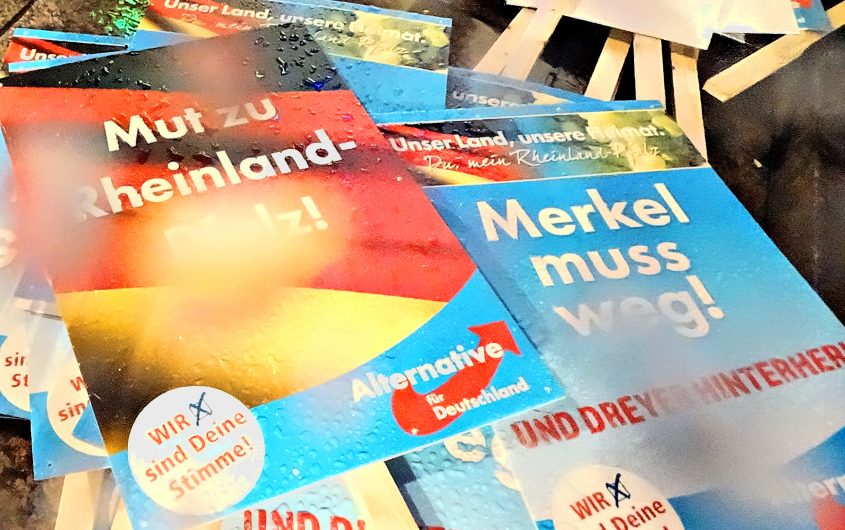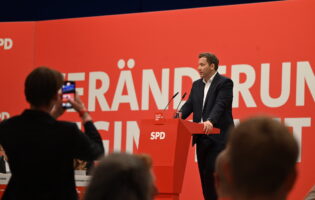
Opposition 24 via Flickr
AfD in Brief

Karl-Rudolf Korte
Universität Duisberg-Essen
Prof. Dr. Karl-Rudolf Korte is Professor of Political Science at the Universität Duisberg-Essen, where he focuses on the political system of the Federal Republic of Germany. He is also the Director of the NRW School of Governance.
How the Far-Right Exploits Public Anxieties and How Germany Can Recapture the Courage to Shape the Future
What is new and what is old about the Alternative for Germany (AfD) phenomenon? What promises ways out? Prof. Dr. Karl-Rudolf Korte of the NRW School of Governance at the University of Duisburg-Essen examines the AfD’s approval rating and provides a comprehensive overview of the alliance of supporters, the party’s mobilization as a “profiteer of fear,” and the gaps in offerings from other parties that the AfD exploits. But there are hopeful ways out of this phenomenon, including the creation of a confident narrative for the future. Prof. Dr. Korte’s analysis was originally published in German by the NRW School of Governance and was translated into English by Fiona Muhleisen.
What is new about the AfD phenomenon?
Since June 2023, support for the AfD in serious opinion polls has exceeded support for Chancellor Scholz’s Social Democrats (SPD). Although these are only measurements of political sentiment and not actual votes, this political symbolism changes the perception of the competition between parties. Never before in the history of our parliamentary democracy has a protest party outperformed the ruling chancellor’s party in the polls. Hence the new alarmism. That said, it is also true that never before has a chancellor received such a small mandate from voters in a Bundestag election as Olaf Scholz did with only 25.7 percent of the votes.
The AfD won its first county administrator post in June 2023, in a run-off election in Sonneberg in the eastern German state of Thuringia. This is the very first time that the AfD has held an executive office at the regional government level. All other democratic parties united in Sonneberg to oppose the AfD candidate, a tactic that had heretofore been successful, but which was insufficient this time. In Thuringia, the AfD is classified by the domestic security agency, the state Office for the Protection of the Constitution, as “proven right-wing extremist.” The AfD can apparently rely on a broad alliance of Thuringian supporters that includes affluent social circles.
The AfD is also active among circles of Putin sympathizers. In the perception of these voters, Russia is seen as a victim rather than a perpetrator in a war of aggression, and as war becomes normalized, the supposed victim-aggressor distinction is being relativized. The AfD is the only party whose platform stands unequivocally on the side of Russia and Putin’s propaganda narrative.
The Federal Office for the Protection of the Constitution’s (BfV) 2022 annual report upgraded the national AfD for the first time to “suspected right-wing extremist.” The BfV assesses that one-third of party members are inclined toward right-wing extremist violence.
The governing traffic light coalition’s management of the reform of the home heating law led to extreme uncertainty across the population. This was not just the result of infighting among the coalition parties. More important was the perception among citizens that the government was failing to make concrete contributions to solving the problem. Moreover, the impositions of the federal government caused an extraordinary level of personal anxiety, because they touched on personal decisions about how to heat one’s private home. Climate protection could not have hit any closer to home or been more intrusive.
What is old about the AfD phenomenon?
The AfD is a passive profiteer of fear and an agitator of resentment. It does not have to do anything to pick up the dissatisfied voters of other parties. Agenda, candidates, harmony, or discord: none of these are relevant issues for AfD voters. The party is a vehicle to put “the others” on notice. The AfD is a deficit party that has very few ideologically committed voters but rather collects communities of disappointed and mistrustful voters from other parties. By now, around 10 percent of the German electorate are protest voters who vote AfD regardless of what the party does in terms of political content or who its candidates are. This includes ethno-nationalist extremist elements. There are additional issue-driven layers on top of this base of frustration. The topic of refugees is especially salient in this context, fully independent of whether refugees are actually visible in the voters’ respective localities.
As an absorber of resentment, the AfD benefits from diffuse fears that tend to accompany the modernization of societies—the dissolution of traditional boundaries and loss of security. The feeling of uneasiness is directed against cultural alienation. The uncertainty relates to fears of downward social mobility and changes being imposed without one’s consent.
As a deficit party, the AfD exploits gaps in the political offerings of the other parties. The AfD neither lectures nor tries to convert, but rather mobilizes on issues that other parties tend to remain silent on due to a lack of common positions. The AfD is thus a populist “eavesdropper” on the unspoken fears of a subset of the German population. Many citizens perceive difference as inequality. How much inequality can democracy tolerate? How much do we need? Which inequalities must we irrevocably accept, and which ones must we never put up with? Difference must be negotiated in a democratic process. Parties have to address it. How much heterogeneity is best for everyone? Impositions from above and fear of change can lead to political homelessness in a democracy. Many AfD voters feel alien in their own country and find appeal in the AfD’s program.
The AfD mobilizes on issues that other parties tend to remain silent on due to a lack of common positions. The AfD is thus a populist “eavesdropper” on the unspoken fears of a subset of the German population.
The weakness of the parties in the center translates into support for the AfD. To a large extent, it is the voters’ disappointment—lack of trust, lack of credibility—in the other parties that makes the AfD seem big at the moment. Moreover, it is to be expected in the middle of the legislative period that approval ratings for the serving government are low.
The greatest threat to preserving the quality of democracy comes from the poison drip of the AfD. Slowly but surely, the leaders of the AfD delegitimize democracy. Institutions, election results, and procedures are called into question. New realities are simply asserted.
The largest pool of voters for the AfD comes from non-voters. In all past elections, the AfD has benefited significantly from mobilizing non-voters to participate in the electoral process.
The ongoing aftermath of the “COVID-ocracy” strengthens the AfD. The effects of “distance democracy” still persist. The density of crises has led to feelings of isolation and irritable COVID-idiosyncrasies. Many citizens are exhausted by change and transformation. These conditions create a breeding ground for authoritarian temptations that promise simple answers and idyllic worlds. The AfD, as a movement fueled by outrage and fear of the future, is a party of nostalgic time travel: it promises a return to the good old days—be it nationalistic, familial, or within a clearly ordered homogeneity. And this all-inclusive package is only for Germans.
What promises a way out?
The AfD has only a few ideologically committed voters. There is no party loyalty among voters in the East. Voters can be mobilized by democratic parties. Parties in the political center should refrain from lecturing voters, copying the AfD, or avoiding seemingly uncomfortable topics. They can win back those who choose the AfD out of fear of transformation but who are reachable as centrist voters.
Previous containment strategies have failed. Neither a firewall of exclusion nor the democratic alliance of “all against one” has proven effective. The contours of the new approach lie in democratic defiance: How can we create experiences of democracy and freedom that inspire passion and solidarity? Voters are fans of success. Nothing excites more than the prospect of electoral victory. Why should that only apply to the AfD nowadays?
Voters love the future. They love optimism. Democracy is associated with the idea that there is a right to the future. Elections serve as a gauge of trust in this promise. One could say that the future is determined in the marketplace of voters. The question then is: Who offers confidence in change? The majority want to move away from fossil fuels, but there must be a plausible prospect of a functioning replacement.
With an optimistic narrative for the future, it is possible to gain majority support for initially unpopular ideas. The courage to shape the future is necessary.
Many citizens perceive a double communication breakdown: They do not feel adequately represented by “politics” or by “the media.” They get the impression that the political center portrayed by the media does not align with the political center in society. This breakdown leads them to turn to alternative media and the AfD, where certain topics resonate with them. Therefore, parties in the center should once again become good hosts, caretakers, and creators of spaces for high-quality encounters. If people have positive experiences with political parties or activities, they share them with others. Building relationships with the real lives of citizens is the key to all forms of mobilization. Only when people feel understood can discourse begin. The solutions for everyday problems must be firmly rooted in the political center through intense conversation. Parties are also bastions of lifestyle. They become successful if their protagonists actively seek proximity to the lives of citizens through their own priorities and style.
A patriotism for change can be infectious too! At the same time, the narrative must be clear: How do the voters gain? What future benefits do they derive from the proposed solution? This can be a selfish benefit, such as improved public transportation or greener cities. It can also be altruistic, to the benefit of future generations. With an optimistic narrative for the future, it is possible to gain majority support for initially unpopular ideas. The courage to shape the future is necessary. People can endure challenges if the stakes are effectively communicated, and if all measures transparently affect everyone. Even a turn toward material reduction can win majorities when it comes with the prospect of achieving a compelling shared goal. Green Party Vice Chancellor and Economics Minister Robert Habeck’s poor polling numbers did not result from the imposition represented by reform of the home heating law. It was rather from the absence of a confident future perspective, which Habeck had conveyed perfectly in averting an energy crisis last winter.
The direction in which a society tends is not determined by the extremes, but instead by the political center. The uprising of the fringes should not lead to a radicalization of the mainstream. Quite the contrary. Which tone does the center set? What vocabulary does it use? The center bears a great responsibility for maintaining social and societal peace at a high level of freedom. It is up to the parties in the center how the political climate changes.
Problem-solving is crucial for the success of center parties. The so-called “outcome” counts. If the governing parties visibly and creatively solve everyday problems faced by citizens, they strengthen trust in democratic processes. A coalition of the outraged becomes a residual factor. People vote for parties that get things done.
Panic and negative karma benefit only the AfD as a party of naysayers. Democracy must face the embittered atmosphere with composure and self-confidence. Blaming the voters only increases their defiance and their tendency to vote for the AfD. Major elections (state and federal elections) follow different patterns at the ballot box than local elections. Germans have reliably strengthened the political center and marginalized the extremes, both left and right, even during major moments of crisis. Why should this German exceptionalism end now, especially in a self-adapting democracy that requires protest to continually course-correct?









